Related Research Articles
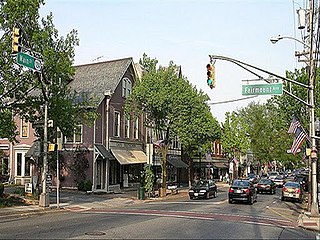
Chatham is a borough in Morris County, in the U.S. state of New Jersey. As of the 2020 United States census, the borough's population was 9,212, an increase of 250 (+2.8%) from the 2010 census count of 8,962, which in turn reflected an increase of 502 (+5.9%) from the 8,460 counted in the 2000 census.
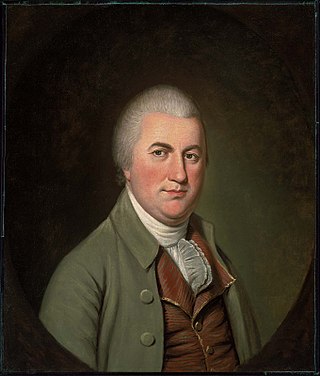
Nathaniel Gorham was an American Founding Father, merchant, and politician from Massachusetts. He was a delegate from the Bay Colony to the Continental Congress and for six months served as the presiding officer of that body under the Articles of Confederation. He also attended the Constitutional Convention, served on its Committee of Detail, and signed the United States Constitution.
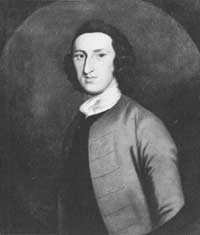
William Livingston was an American politician and lawyer who served as the first governor of New Jersey (1776–1790) during the American Revolutionary War. As a New Jersey representative in the Continental Congress, he signed the Continental Association and the United States Constitution. He is considered one of the Founding Fathers of the United States and a Founding Father of New Jersey.

William Paterson was an American statesman, lawyer, jurist, and signer of the United States Constitution. He was an Associate Justice of the United States Supreme Court, the second governor of New Jersey, and a Founding Father of the United States.

Gunning Bedford Jr. was an American Founding Father, delegate to the Congress of the Confederation, Attorney General of Delaware, a delegate to the Constitutional Convention in 1787 which drafted the United States Constitution, a signer of the United States Constitution, and a United States district judge of the United States District Court for the District of Delaware.
William Pierce Jr. was Founding Father of the United States, military officer during the Revolutionary War, member of the Continental Congress, merchant, and planter and slave owner. As a delegate representing Georgia at the Constitutional Convention of 1787, he signed the U.S. Constitution.
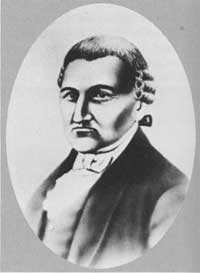
David Brearley was an American Founding Father, Chief Justice of the Supreme Court of New Jersey, a delegate from New Jersey to the Constitutional Convention of 1787, which drafted the United States Constitution, a signer of the United States Constitution, and a United States district judge of the United States District Court for the District of New Jersey.

French involvement in the American Revolutionary War of 1775–1783 began in 1776 when the Kingdom of France secretly shipped supplies to the Continental Army of the Thirteen Colonies when it was established in June 1775. France was a long-term historical rival with the Kingdom of Great Britain, from which the Colonies were attempting to separate.

The Congress of the Confederation, or the Confederation Congress, formally referred to as the United States in Congress Assembled, was the governing body of the United States from March 1, 1781, until March 3, 1789, during the Confederation period. A unicameral body with legislative and executive function, it was composed of delegates appointed by the legislatures of the several states. Each state delegation had one vote. It was preceded by the Second Continental Congress (1775–1781) and was created by the Articles of Confederation and Perpetual Union in 1781.

The history of American newspapers begins in the early 18th century with the publication of the first colonial newspapers. American newspapers began as modest affairs—a sideline for printers. They became a political force in the campaign for American independence. Following independence the first amendment to U.S. Constitution guaranteed freedom of the press. The U.S. Postal Service Act of 1792 provided substantial subsidies: Newspapers were delivered up to 100 miles for a penny and beyond for 1.5 cents, when first class postage ranged from six cents to a quarter.
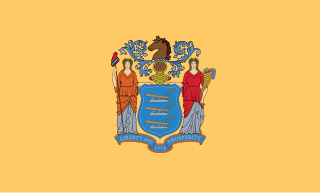
New Jersey played a central role in the American Revolution both politically and militarily. It was the site of more than 90 military engagements, including the pivotal battles of Trenton, Princeton, and Monmouth. George Washington led his army across the state four times and encamped there during three hard winters, enduring some of the greatest's setbacks of the war as well as seminal victories. New Jersey's decisive role in the conflict earned it the title, "Crossroads of the American Revolution".

The Massachusetts Line was those units within the Continental Army that were assigned to Massachusetts at various times by the Continental Congress during the American Revolutionary War. These, together with similar contingents from the other twelve states, formed the Continental Line. Line regiments were assigned to a particular state, which was then financially responsible for the maintenance of the regiment. The concept of the line was also particularly important in relation to the promotion of commissioned officers. Officers of the Continental Army below the rank of brigadier general were ordinarily ineligible for promotion except in the line of their own state.

Shepard Kollock, Jr. was an editor and printer, who was active in colonial New Jersey during the period of the American Revolutionary War. He also held various government positions in the newly founded state of New Jersey during the early 1800s.
Dr. Jabez Campfield was a colonial-era doctor, one of the earliest to set up practice in Morristown, New Jersey. He served as a surgeon in the Continental Army during the American Revolutionary War. During the Continental Army's winter encampment in Morristown in 1777, Dr. Campfield helped inoculate soldiers against a smallpox outbreak that spread through the army and the area that winter. Dr. Campfield was a surgeon on the Sullivan Expedition in upstate New York in the summer and autumn of 1779, during which he kept a detailed diary which has been preserved and published. During the winter encampment of 1779-1780, surgeon general Dr. John Cochran stayed in Dr. Campfield's home, and his home served as a "flying hospital". Dr. Cochran's niece, Elizabeth Schuyler, came to stay in Dr. Campfield's home, and while there fell in love and became engaged to Founding Father Alexander Hamilton.
Jacob Green was a Presbyterian pastor and acting president of Princeton University. A resident of Hanover, Green was also the delegate for Morris County to the fourth assembly of the Provincial Congress of New Jersey in 1776 and served as chairman of the constitutional committee.

Early American publishers and printers played a central role in the social, religious, political and commercial developments in colonial America, before, during, and after the American Revolution. Printing and publishing in the 17th and 18th centuries among the Thirteen Colonies of British North America first emerged as a result of religious enthusiasm and over the scarcity and subsequent great demand for bibles and other religious literature. By the mid-18th century, printing took on new proportions with the newspapers that began to emerge, most notably in Boston. When the British Crown began imposing new taxes, many of these newspapers became highly critical and outspoken about the British colonial government, which was widely considered unfair among the colonists.
Samuel Loudon (1727–1813) was a colonial American printer, publisher and merchant who emigrated from Ireland some time prior to 1753. Loudon founded The New-York Packet and The American Advertiser and became the postmaster at New York State's first post office in Fishkill, New York. During the American Revolution he became the official printer of New York State and printed its first Constitution, laws, acts and other official documents, while also taking on some private commissions. Before and during the Revolution Loudon became active through the use of his newspapers promoting the cause for American independence, and for freedom of the press. After the war Loudon printed the Laws of the City of New York, and later promoted ratification of the proposed Constitution by publishing selected essays of The Federalist Papers in his newspaper.
References
- 1 2 3 Staff. "Lieut Shepard Kollock, Jr". Find A Grave. Retrieved May 19, 2013.
- ↑ "Eighteenth-Century American Newspapers in the Library of Congress (New Jersey)". Serial & Government Publications Division - Newspaper & Current Periodical Reading Room. Library of Congress. May 8, 2009. Retrieved May 18, 2013.
- ↑ Staff. "New Jersey Loses Oldest Paper", The Palm Beach Post , January 3, 1992. Accessed March 21, 2012. "The Daily Journal, the state's oldest newspaper, will close Friday after losing money for two years. Publisher Richard J. Vezza wouldn't say how much money the 212-year-old newspaper had lost. Most of its 84 employees will be laid off."
- ↑ Journal of the proceedings of the Legislative Council of the State of New Jersey